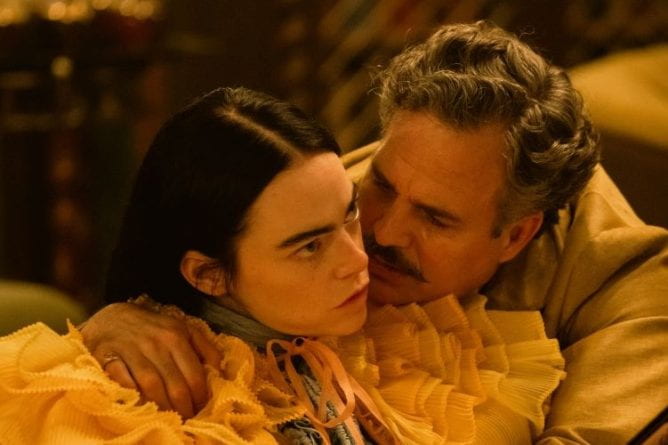In Poor Things, director Yorgos Lanthimos (The Favorite, The Killing of a Sacred Deer) crafts a tale reminiscent of a mythical hero’s journey, telling the story of a woman newly created by mad science embarking on a quest to discover herself. Bella Baxter (Emma Stone) is returned from the dead by Dr. Godwin Baxter (Willem Dafoe) with no memories and the mind of an infant, rapidly maturing as her brain grows to fit her body. She exists entirely within Godwin’s control as a scientific experiment, her movements meticulously documented by his assistant (Ramy Youssef) who quickly becomes infatuated with her. At the same time, Bella begins to discover her own sexuality, finding enjoyment in pleasure but confused by social constraints and soon desiring to see the world outside Godwin’s abode. An opportunity for her escape comes in the form of Duncan Wedderburn (Mark Ruffalo), a hedonistic lawyer who offers to take her away. The pair subsequently embark on a sex-filled tour of the Mediterranean, where Bella discovers within herself a deep desire to help the unfortunate of the world.
Poor Things is highly concerned with the interplay between sex and self-determination. It is certainly not for viewers who might find such content offensive, and those who would prefer not to see extended on-screen sex might do well to give this film a pass. Throughout its runtime, Poor Things depicts sexual activity in several different ways. First, Bella is exploited, her naïveté and newfound sexual appetite taken advantage of by Duncan. Later, she finds sex to be a useful tool, a way to get ahead in life and succeed financially, though not for her own enjoyment. It is only by the end of the film that she is able to strike a balance, breaking free from the men who attempt to cage her and claiming her sexuality as her own. She once again embraces her own pleasure, though unlike at the beginning, she is now the one fully in control of her own fate, and her pleasure is not used to manipulate her.
:max_bytes(150000):strip_icc()/Emma-Stone-Poor-Things-051123-96812c85a8514abc8fdfe2a0b7c5c5ce.jpg)
In one way another, all of the film’s male characters attempt to hold Bella down – Godwin through scientific experimentation and Duncan through hedonism and failed manipulation, to name a few – and all of them ultimately fail in their goals. Poor Things is a fable of Bella Baxter’s liberation, her embrace of her own self as an independent entity, and her refusal to be shamed for her sexuality or compromise with a male-dominated Victorian society. It shines as one of the most unabashedly sex-positive movies in recent memory, and one that handles its themes with a healthy balance of maturity and comedic effect. Emma Stone is of particular note for her performance as the Frankenstein’s Monster-esque Bella, learning of the world for the first time, as is Mark Ruffalo’s excellent comedic turn as Duncan. Every aspect of the film’s visuals is impeccable, from the eclectic and architecturally fascinating set design to the colorful costuming and aggressive soundtrack. The cinematography and camerawork are also worth praising, full of quick zooms and wide-angle lenses that lends the film a unique visual aspect that compliments its surreal landscape. Overall, Poor Things is an excellent piece of liberatory fiction, full of rich visuals, raunchy comedy, emotional depth, and compelling characters. It is both deeply odd and deeply political, featuring one of the year’s best performances in Emma Stone’s Bella Baxter, and absolutely worth a watch – though perhaps not for the faint of heart.
4.5/5 STARS
